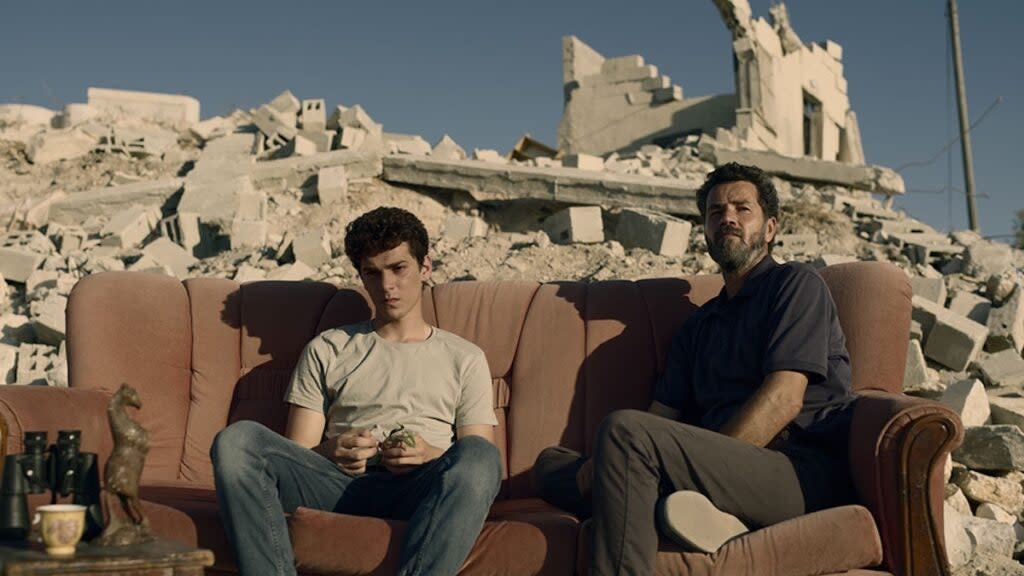‘The Teacher’ Review: Palestinian Drama Paints a Portrait of Futility and Rage

Three years ago, Farah Nabulsi’s short film “The Present” landed an Oscar nomination and won a BAFTA Award by stripping down the conflict between Palestinians and Israelis on the West Bank to a father and daughter’s simple quest to buy an anniversary present. Nabulsi, who was born in London to Palestinian parents, returns to that region and conflict with her feature debut, “The Teacher,” but there’s nothing simple about the morass into which her filmmaking plunges us this time around.
Inspired by true events, the film is set among Palestinians on the West Bank, and like “The Present” it’s a portrait in futility. “The Teacher,” which had its world premiere on Saturday at the Toronto International Film Festival, sometimes feels as if it’s hammering away at the same points without getting anywhere, but you could argue that’s an entirely fitting way to depict the conflicts in that area.
The title character is Basem El-Saleh (Saleh Bakri), a divorced man who teaches in a school on the West Bank where most of his male students have already spent time in Israeli detention centers. Two of those students, Yacoub and Adam, are brothers, with Yacoub a brawny type who doesn’t do well in school and Adam his studious younger brother. They come home one day after school to find that their house is being demolished by the Israelis, who then present them with a bill and threaten to throw them in jail if they can’t pay.
“Most of the houses in the village have demolition orders, including mine,” Basem tells Lisa (Imogen Poots), a British social worker who has come to work at the school. “They carry out the demolition orders and then charge the homeowners for the demolition.”
Yacoub and Adam also spot Israeli settlers setting fire to the Palestinians’ olive trees one evening – but when they rush into the grove to stop the arson, one settler shoots and kills Yacoub, sending Adam (a compelling Muhammad Abed El Rahman) into a spiral of depression and rage.
But “The Teacher” regularly cuts away from this narrative to offer glimpses of another story: Nathaniel Cohen, an American soldier who left his home in the U.S. to fight for Israel, has been taken hostage by a Palestinian resistance group, who are asking for 1,200 of their prisoners in exchange for his release.
The two stories feel separate, but they’re not because Basem turns out to be quietly helping the resistance – and for a brief period, the hostage is hidden in the teacher’s house. It’s then that Basem begins to reveal his past, both to Adam and to Lisa, with whom he’s struck up a romance. The courtship seems curiously out of place in this film, except as a way to insist that life goes on in the toughest of situations, but it gives Bakri a couple of wrenching scenes that flesh out his character’s painful journey. “I’m chained to my f—ing past,” he tells Lisa.
Bakri also shines in a conversation between Basem and Nathaniel Cohen’s father, who tracks down the teacher after he’s tipped off by Israeli police that Basem might have been involved in hiding the hostage. You’d think the father might be there to kill Basem, but instead he begs for his son’s life. The teacher can’t admit he knows anything, but at the end he lets some info slip.
“They’ll keep him alive for as long as it takes,” he says.
“How do you know that?” the father says.
“Because they know your people believe that your son is worth a thousand of mine.”
Shot in occupied territory on the West Bank, “The Teacher” is charged, angry and incredulous about the injustices and indignities visited upon Palestinians there; it’s an effective polemic that views the situation through a variety of characters from a single perspective. Nabulsi struggles to hold it all together at times, but she hasn’t lost her ability to tell a big story through smaller individual journeys. And while her movie flirts with happier resolutions, it’s not interested in hanging on to false hopes for long.
Ground zero here – for the characters, for the nations, for the filmmaker – is futility. Nabulsi drops us on that ground and doesn’t let us pretend it’s anything else.
The post ‘The Teacher’ Review: Palestinian Drama Paints a Portrait of Futility and Rage appeared first on TheWrap.


